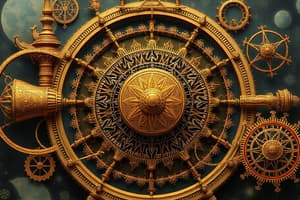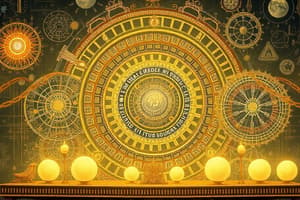Podcast
Questions and Answers
What is a central concept of quantum mechanics that states certain properties cannot be precisely measured at the same time?
What is a central concept of quantum mechanics that states certain properties cannot be precisely measured at the same time?
- Wave-particle duality
- Quantum states
- Quantization of energy
- Uncertainty principle (correct)
Which application relies on the principles of quantum mechanics?
Which application relies on the principles of quantum mechanics?
- Quantum computing (correct)
- Simple mechanical levers
- Mechanical clocks
- Gravity-based propulsion systems
Which phenomenon demonstrates that particles can exhibit wave-like properties?
Which phenomenon demonstrates that particles can exhibit wave-like properties?
- Wave-particle duality (correct)
- Classical wave interference
- Energy quantization
- Thermodynamic equilibrium
What aspect of classical mechanics is fundamentally different in quantum mechanics?
What aspect of classical mechanics is fundamentally different in quantum mechanics?
Which technology is an application of optical fibers?
Which technology is an application of optical fibers?
What does Newton's first law state about an object in motion?
What does Newton's first law state about an object in motion?
What is the relationship expressed in Newton's second law of motion?
What is the relationship expressed in Newton's second law of motion?
Which law states that energy cannot be created or destroyed?
Which law states that energy cannot be created or destroyed?
What describes the total entropy of an isolated system over time?
What describes the total entropy of an isolated system over time?
What do Maxwell's equations summarize?
What do Maxwell's equations summarize?
Which phenomenon occurs due to the interaction of electric and magnetic fields?
Which phenomenon occurs due to the interaction of electric and magnetic fields?
What is the primary focus of optics?
What is the primary focus of optics?
What does refraction of light involve?
What does refraction of light involve?
Flashcards
What is Quantum Mechanics?
What is Quantum Mechanics?
Quantum mechanics is a branch of physics that describes the behavior of energy and matter at the atomic and subatomic levels, where classical physics breaks down.
Quantization of Energy
Quantization of Energy
In quantum mechanics, energy and other properties can only exist in discrete values, like steps on a staircase, rather than a continuous range.
What is the Heisenberg Uncertainty Principle?
What is the Heisenberg Uncertainty Principle?
This principle states that you can't know both the position and momentum of a particle with perfect accuracy at the same time. The more you know about one, the less you know about the other.
What is Wave-Particle Duality?
What is Wave-Particle Duality?
Signup and view all the flashcards
How is Quantum Mechanics Applied?
How is Quantum Mechanics Applied?
Signup and view all the flashcards
Classical Mechanics
Classical Mechanics
Signup and view all the flashcards
Newton's Second Law of Motion
Newton's Second Law of Motion
Signup and view all the flashcards
Heat
Heat
Signup and view all the flashcards
Work
Work
Signup and view all the flashcards
Electromagnetism
Electromagnetism
Signup and view all the flashcards
Optics
Optics
Signup and view all the flashcards
Dispersion of Light
Dispersion of Light
Signup and view all the flashcards
Interference of Light
Interference of Light
Signup and view all the flashcards
Study Notes
Classical Mechanics
- Classical mechanics describes the motion of macroscopic objects.
- It is based on Newton's laws of motion, which relate force, mass, and acceleration.
- Newton's first law states that an object at rest stays at rest and an object in motion stays in motion with the same speed and in the same direction unless acted upon by an unbalanced force.
- Newton's second law states that the acceleration of an object is directly proportional to the net force acting on it and inversely proportional to its mass. (F = ma)
- Newton's third law states that for every action, there is an equal and opposite reaction.
- Concepts like momentum, energy, and angular momentum are fundamental to understanding motion.
- Applications include analyzing planetary orbits, projectile motion, and the behavior of mechanical systems.
Thermodynamics
- Thermodynamics deals with heat, work, and temperature.
- It describes the relationship between these quantities and how they affect systems.
- Key concepts include:
- Temperature: A measure of the average kinetic energy of particles in a substance.
- Heat: The transfer of thermal energy between objects at different temperatures.
- Work: Energy transferred by a force acting through a distance.
- The first law of thermodynamics: Energy cannot be created or destroyed, only transferred or changed from one form to another.
- The second law of thermodynamics: The total entropy of an isolated system can only increase over time.
- Applications include power generation, refrigeration, and understanding chemical reactions.
Electromagnetism
- Electromagnetism describes the interaction between electric and magnetic fields.
- Key concepts include:
- Electric charges create electric fields.
- Moving charges create magnetic fields.
- Electric and magnetic fields interact and influence each other.
- Maxwell's equations summarize the fundamental laws governing electromagnetic fields.
- Electromagnetic waves, such as light, are a result of oscillating electric and magnetic fields.
- Applications include:
- Electricity generation and distribution.
- Electronic devices and communication technologies.
- Radio waves and other forms of electromagnetic radiation.
Optics
- Optics deals with the behavior of light.
- Topics include:
- Reflection and refraction of light.
- Dispersion of light (separation of colors).
- Formation of images using lenses and mirrors.
- Interference and diffraction of light.
- Applications include:
- Telescopes and microscopes.
- Optical fibers.
- Photography.
- Lasers and other light-based technologies.
Quantum Mechanics
- Quantum mechanics describes the behavior of matter and energy at the atomic and subatomic level.
- It differs significantly from classical mechanics.
- Key concepts include:
- Quantization of energy and other properties.
- Wave-particle duality: Particles can exhibit wave-like properties, and waves can exhibit particle-like properties.
- Uncertainty principle: The position and momentum of a particle cannot be precisely known simultaneously.
- Quantum states and wave functions.
- Application of quantum mechanics include modern technologies such as lasers, transistors, and nuclear power.
- Many areas of modern physics and chemistry heavily rely on quantum mechanical principles.
Studying That Suits You
Use AI to generate personalized quizzes and flashcards to suit your learning preferences.




